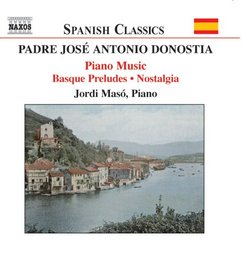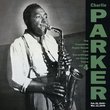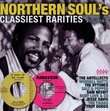| All Artists: Jose Antonio de Donostia, Jordi Masó Title: Padre Josť Antonio Donostia: Basque Preludes Members Wishing: 0 Total Copies: 0 Label: Naxos Release Date: 11/16/2004 Genre: Classical Styles: Chamber Music, Historical Periods, Classical (c.1770-1830) Number of Discs: 1 SwapaCD Credits: 1 UPC: 747313222827 |
Search - Jose Antonio de Donostia, Jordi Masó :: Padre Josť Antonio Donostia: Basque Preludes
 | Jose Antonio de Donostia, Jordi Masó Padre Josť Antonio Donostia: Basque Preludes Genre: Classical Padre Donostia was not only one of the greatest Basque composers of sacred, symphonic and stage music, but also a highly influential collector of and expert in his native region?s folk-music. His greatest achievement was t... more » |
Larger Image |
CD DetailsSynopsis
Album Description Padre Donostia was not only one of the greatest Basque composers of sacred, symphonic and stage music, but also a highly influential collector of and expert in his native region?s folk-music. His greatest achievement was to bring prestige to traditional Basque music, faithfully and elegantly conveying its deeper significance, as well as achieving the perfect balance between the direct assimilation of tradition and the huge influence of his impressionist contemporaries, Ravel and Debussy. In their depiction of text, landscape, children?s games and music from religious processions and festivities, his Preludes for piano show a charming simplicity and nostalgic lyricism. Similar CDs
|
CD ReviewsPleasant Piano Pieces by a Basque Miniaturist J Scott Morrison | Middlebury VT, USA | 12/18/2004 (4 out of 5 stars) "I'd be willing to bet that most music-lovers have not ever heard of a Basque composer named Padre José Antonio Donostia (1886-1956), who was born José Gonzalo de Zulaica y Arregui but took the name, when he was ordained as a priest, of his native city, San Sebastian, whose name is Basque is 'Donostia.' He had a fairly standard musical education, including time studying impressionism in France, and spent most of his professional life writing sacred works. But he also collected Basque folksongs, and his arrangements of them, in four books, called 'Euskal Preludioak' ('Basque Préludes') and probably his most important compositions, are the major works on this CD. There are twenty-one of them, lasting 52 minutes in all, and sound for all the world like Grieg character pieces with a slight Spanish and French cast. The first prelude, called 'Bat-batian' ('Improvisation') startles one because the melody is essentially identical to the tune that English-speakers call 'Twinkle, Twinkle Little Star,' and which Mozart immortalized in a set of variations on the same tune, in French called 'Ah! Vous dirai-je, Maman.' This prelude and most of the others are in an easy-flowing, melodious, highly pianistic, finely crafted style that is probably within the reach of most moderately advanced pianists. In this sense they are analogous to Grieg's miniatures or Mendelssohn's 'Songs with Words.' No. 4, 'Eresia' ('Sad Song') has a melody that lingers in the memory and middle section that is strongly influenced by figurations in Schumann's 'Kinderszenen,' not a bad model. No. 11, 'Mutillen karrika-eresiak' ('Young Men's Serenade') has a clomping open-fifths bass ostinato that sounds a little like an Indian war-dance music or one of Bartók's Rumanian dances for piano. But it breaks out of that mold to take on feathery right-hand runs that glint in the sunlight. No. 12, 'Ilargitan, emazte-gayanerontz'* ('Singing in the Moonlight') betrays Donostia's exposure to the perfumed impressionism of Ravel and Debussy. It is a lovely tone picture drenched in nostalgia. No. 14, 'Irulea' ('The Spinner Woman') is altogether more serene than Mendelssohn's or Schubert's frantically busy maidens of the spinning-wheel, and she is finished in less than a minute! No. 16, 'Eztei-taldea' ('The Wedding Procession') is a giddy march with a middle section of arpeggiated left-hand and a long-limbed melody. No. 17, 'Errotazuriko Urretxindorra' ('The Nightingale of Errotazuri') is a languid evocation of that fabled songstress of the night. There are several other pieces included here that are not from the collection of folksong arrangements, and they total about twenty-five additional minutes. They are, however, in much the same style as the folksongs. I particularly liked 'Tiento y canción' ('Tiento and Song') which imitates, quite nicely, the arpeggios and plucked chords of the guitar, and 'Homenaje a Juan Crisóstomo Arriaga' ('Homage to Juan Crisóstomo Arriaga'), written in imitation of the classical style of one of Spain's greatest composers who died in 1826 at the cruelly early age of 20 but who left us some real treasures, some of which have also been included in the Naxos 'Spanish Classics' series to which this CD also belongs. Jordi Masó is a fine Catalan pianist whose light and flexible touch is perfect for these little character pieces, and he is given lifelike recorded sound here. Masó has also recorded much music by other Spanish composers including Soler, Mompou and Turina. TT=78:25 Recommended. Scott Morrison *If you ever needed evidence that the Basque language is unrelated to any other European language, just take a look at the titles of these pieces!" Enjoyable Robert T. Martin | 02/24/2008 (4 out of 5 stars) "There's really nothing to add to Mr. Morrison's comprehensive review. The composer seems to travel across all manner of styles and composers, Grieg, Chopin, Debussy even a bit of Beethoven are evoked- sometimes in a single piece. Since I'm completely unfamiliar with any type of Basque music I can't
say that the pieces here are folkloric in any way. No matter, all the pieces lie sweetly on the ear. It's unfortunate that Amazon didn't provide sound samples for this recording because a listen to track 12, "Singing in the Moonlight" might have been enough to convince you to acquire it. If seeing two reviews induces someone to try this delightful recording maybe I accomplished something. Sound and performance are first rate." |




